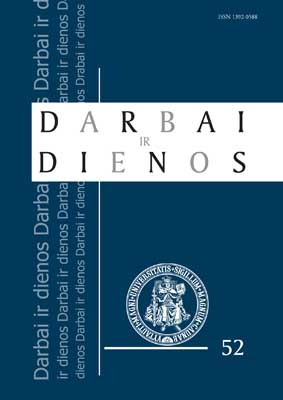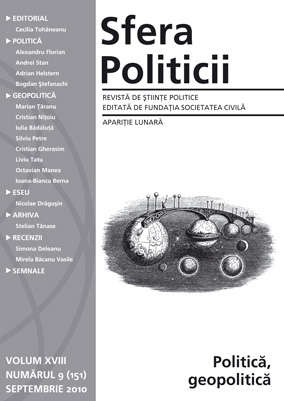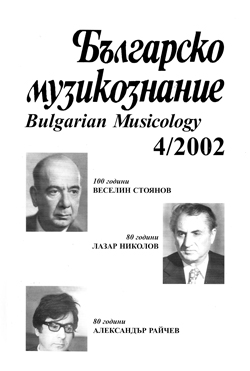
We kindly inform you that, as long as the subject affiliation of our 300.000+ articles is in progress, you might get unsufficient or no results on your third level or second level search. In this case, please broaden your search criteria.


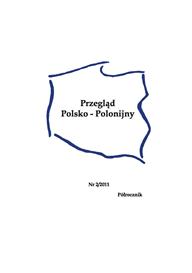


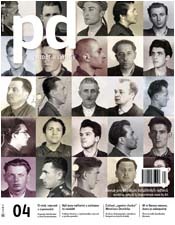
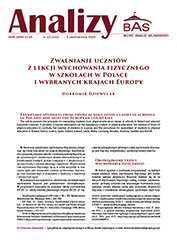
The article presents the principles for exempting students from physical education classes in schools in Poland and selected European countries. It provides a concise information on the mandatory content of physical education, the number of hours of physical education in curricula, the number of students in a group and the procedures for assessment of students in physical education in Poland, France, Greece, Spain, Ireland, Iceland, Latvia, Malta, Germany, Slovakia, Slovenia, Sweden and the UK.
More...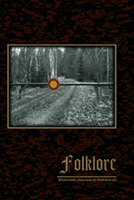
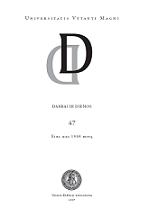
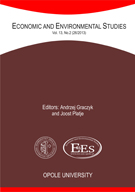
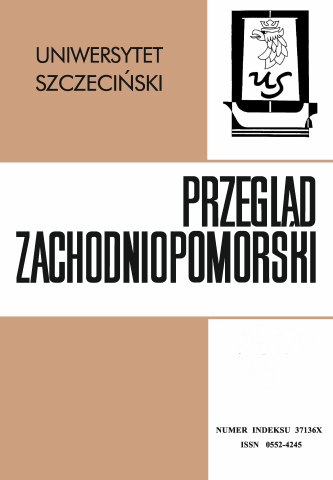
The article presents the units that participated in the fights in Western Pomerania (German: Provinz Pommern) in January and February 1945: the 6th foreign Waffen-SS Division (the 11th Voluntary Armoured SS Division Nordland, the 15th Grenadiers’ Division Lettland, the 23rd Voluntary Armoured Grenadiers’ SS Division Nederland, the 27th Voluntary Armoured Grenadiers’ Division Langemarck, the 28th Voluntary Armoured Grenadiers’ Division Wallonien, the 33rd Grenadiers’ SS Division Charlemagne) and anti-Stalinist units of the 1st Division of the Russian Liberation Army (ROA), which was part of the so-called Własow Army. At the beginning there is a presentation of the genesis of the armed forces of the SS composed of West-European volunteers (Danes, Norwegians, Swedes, Finns, Frenchmen, Belgian Walloons and Flemings), the profiles of some of their leaders, the structure of the forces and the sites of some earlier battles (especially during the period of 1943–1944) against a wider background of the Pomeranian operations of the Red Army and the units of the 1st Polish Army. Later there is a presentation of the military situation at the end of 1944 and the beginning of 1945 and the effects of the January offensive of the Red Army, as well as the circumstances of how the foreign units of the Waffen-SS reached Western Pomerania and how they were reconstructed (the 15th SS Division Lettland) and their initial battle operations. The first chapters depict the battle operations of the units of the 15th Latvian SS Division Lettland on the ‘Pomeranian Embankment’ and later near Kamień Pomorski, and the fate of the units after the defeat in Western Pomerania. One of the episodes described in detail is the war crimes against the Polish soldiers who had been taken captive at the beginning of February 1945 in the village of Podgaje (German: Flederborn) committed by either Latvian SS-men or the Dutch ones from the Division Nederland. The first chapters also depict the battles fought by the 33rd French SS Division Charlemagne on its combat trail from Szczecinek (German: Neusttetin) to Białogard on the Parsęta River (German: Belgard) and Karlino (German: Körlin), and in defence of the Twierdza Kołobrzeg (German: Festung Kolberg; English: Kolberg Stronghold). In the background there are other military operations in Pomerania, among other things the defeat of the 10th SS Army Corps or the battles in retreat between Dziwnów (German: Dievenow) and Trzęsacz (German: Haff). These descriptions have been supplemented with the presentation of the battles fought by the units of the 1st Division of the ROA (S.K. Bunjaczenko was its commander but it was subordinated to Wehrmacht) along the Oder, including – among other things – groups of tank destroyers at Gozdowice (German: Güstebiese) and South of Szczecin, as well as on the combat trail of the Własow Army from Brandenburg, through Lusatia (Polish: Łużyce), to Czechoslovakia, where the Army finally ceased to exist.
More...
Since the 1960s Polish sociologists have been carrying out research on seaside communities, maritime professions and maritime industry companies. Fishermen and seamen constituted a particularly interesting subject of study. The author refers to the issues of isolation which is the result of several months’ long stay on an oceangoing vessel. In the article after describing the ‘therapeutic’ (for respondents) function of research discovered during in-depth interviews with seamen, the author analyses various kinds and degrees of isolation they experience
More...

The bronze crucifixes found in Western Pomerania are examples of tiny crucifixes that were extremely popular during the Romanesque period. In the 12th century and later they were the basic equipment of churches, where they used to be placed on the altars, carried in processions, and used in liturgy or as reliquaries. Both the examples described in the text are realisations of the same pattern within one workshop. On the other hand, they present different forms: the crucifix from Żelichowo is more naturalistic and its character is more creative, whereas the one from Pyrzyce is more schematic (or simplistic) and decorative. The specific form of the head and the structure of the perizoma situate both, according to the classification of Peter Boch, in the group of crucifixes called Hermannburger Folge. Very strong resemblance of both to the image on the Płock Gates, especially in the shapes of the heads with the dominating nose, a ‘garland’ of a beard and slanting eyes, makes it possible to connect both the crucifixes with the Magdeburg workshop and date them to the 7th century. They have been found within the limits of the Duchy of Pomerania (German: Herzogtum Pommern), which testifies that the first Pomeranian churches functioned according to the customs of the time; they also confirm that the transportation tracks, which were bustling with activity, linked the region with important European centres, especially with Magdeburg, which played a significant role in the cultural and civilisational development of Pomerania and Poland
More...
The Prussian province of Pomerania (German: Provinz Pommern) was one of the bastions of the Nazi (National Socialist) movement. A fter J anuary 3 0th, 1933 w hen Hitler assumed power in Germany, the Nazi authorities from Szczecin (German: Stettin), capital of the Province, headed by Gauleiter Wilhelm Karpenstein, and later by Franz Schwede-Coburg, began introducing the new order based on terror and ‘standardisation’ of the social life. In order to testify to the unity of the German nation, the authorities held numerous mass rallies, where the region’s NSDAP leaders gave speeches, which were broadcast; they also staged marches with torches of the party organisations and of the SA (Sturmabteilung, English: Storm Detachment or Assault Division, or Brownshirts). Yet the most important propagandist event was Hitler’s visit to Szczecin on June 12th, 1938 on the occasion of the Congress of the Pomeranian NSDAP (German: Gautreffen Pommern). Führer’s visit has some implications even today, as many inhabitants of Szczecin believe that Hitler is still an Honorary Citizen of Szczecin. The title was conferred to him as early as April 4th, 1933, but Hitler collected the title during his visit to Szczecin five years later. Hitler’s stay in Szczecin was to elevate the status of the Pomeranian Province on the political and economic map of the Third Reich, and the status of the policy of the local authorities who promoted the image of Pomerania as a ‘bastion of the German character’, a ‘borderline province’ and the eastern granary of the Reich. The objective of the article has been to analyse Führer’s visit to Szczecin, its genesis and its political significance for the city and the province, based on the most important Szczecin’s periodical during the period of the Third Reich, “Pommersche Zeitung”. The visit was a wonderful occasion for the periodical’s agitators to blatantly disseminate the cult of Hitler in a spirit of National Socialism, which led to political indoctrination of the local Germans who were taught to be ready to sacrifice everything and to be thoughtlessly faithful to Hitler.
More...
The objective of the article is to present the reception of the Polish Western ideas in Western Pomerania in 1945–1956. The author concentrates on the assimilation of the ideas in question and on the popularisation of the information on the Slavic past of Western Pomerania among its inhabitants. After the Second World War the Polish historians, being under political pressure, gave up dealing with problems of the Jagellonian period of the Polish history (in Western Pomerania). Instead, they turned their attention to problems of western ideas. The Polish historians decided to concentrate their efforts on the justification of the legality of Poland’s new western borders and on the confirmation of the Polish character of the Recovered Lands. The people connected with the western ideas denied and belittled the German influences in the past of those lands. They concentrated on the relics of the Piast past of those lands. Those relics, considered to belong to the Polish culture, were to familiarise settlers with the new surroundings. The objective of the people connected with the Polish western ideas was to create a new cultural landscape saturated with the Slavic past of Western Pomerania and its political links with Poland. It was important to generate historical and cultural bonds, and a sense of intimacy of cultural heritage of Pomerania among settlers coming from different parts of Poland. The Polish western ideas in Western Pomerania were based on illusory foundations. Searching for the Polish relics in Pomerania that certified its Slavic past was – in some cases – interpreted in a fairly naïve way. Some groups of Polish settlers were open to the persuasion which was to convince them that Poland had come back to the Piast lands, and such settlers more easily adopted a positive attitude to their new surroundings. Yet, the Slavic roots of Western Pomerania were not so important for the majority of the settlers. There were other factors that counted more than the past. The subsequent generations of the Pomeranian inhabitants took a different attitude: they treated the region as their little homeland. It was just the second generation that was the most susceptible to the Polish western ideas, it was the generation already born in Pomerania. Yet, in Western Pomerania there was no centre to propagate the Western ideas, they were propagated by individual people.
More...